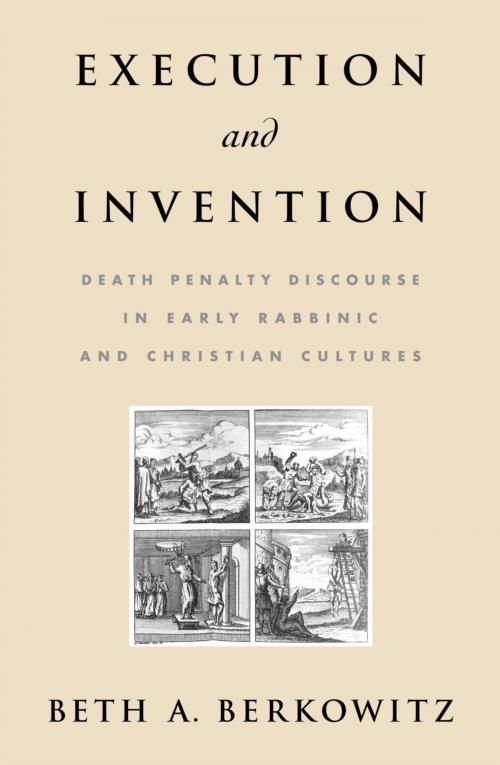Execution and Invention
Death Penalty Discourse in Early Rabbinic and Christian Cultures
Nonfiction, Religion & Spirituality, Judaism| Author: | Beth A. Berkowitz | ISBN: | 9780190292539 |
| Publisher: | Oxford University Press | Publication: | March 23, 2006 |
| Imprint: | Oxford University Press | Language: | English |
| Author: | Beth A. Berkowitz |
| ISBN: | 9780190292539 |
| Publisher: | Oxford University Press |
| Publication: | March 23, 2006 |
| Imprint: | Oxford University Press |
| Language: | English |
The death penalty in classical Judaism has been a highly politicized subject in modern scholarship. Enlightenment attacks on the Talmud's legitimacy led scholars to use the Talmud's criminal law as evidence for its elevated morals. But even more pressing was the need to prove Jews' innocence of the charge of killing Christ. The reconstruction of a just Jewish death penalty was a defense against the accusation that a corrupt Jewish court was responsible for the death of Christ. In Execution and Invention, Beth A. Berkowitz tells the story of modern scholarship on the ancient rabbinic death penalty and offers a fresh perspective using the approaches of ritual studies, cultural criticism, and talmudic source criticism. Against the scholarly consensus, Berkowitz argues that the early Rabbis used the rabbinic laws of the death penalty to establish their power in the wake of the destruction of the Temple. Following recent currents in historiography, Berkowitz sees the Rabbis as an embattled, almost invisible sect within second-century Judaism. The function of their death penalty laws, Berkowitz contends, was to create a complex ritual of execution under rabbinic control, thus bolstering rabbinic claims to authority in the context of Roman political and cultural domination. Understanding rabbinic literature to be in dialogue with the Bible, with the variety of ancient Jews, and with Roman imperialism, Berkowitz shows how the Rabbis tried to create an appealing alternative to the Roman, paganized culture of Palestine's Jews. In their death penalty, the Rabbis substituted Rome's power with their own. Early Christians, on the other hand, used death penalty discourse to critique judicial power. But Berkowitz argues that the Christian critique of execution produced new claims to authority as much as the rabbinic embrace. By comparing rabbinic conversations about the death penalty with Christian ones, Berkowitz reveals death penalty discourse as a significant means of creating authority in second-century western religious cultures. Advancing the death penalty discourse as a discourse of power, Berkowitz sheds light on the central relationship between religious and political authority and the severest form of punishment.
The death penalty in classical Judaism has been a highly politicized subject in modern scholarship. Enlightenment attacks on the Talmud's legitimacy led scholars to use the Talmud's criminal law as evidence for its elevated morals. But even more pressing was the need to prove Jews' innocence of the charge of killing Christ. The reconstruction of a just Jewish death penalty was a defense against the accusation that a corrupt Jewish court was responsible for the death of Christ. In Execution and Invention, Beth A. Berkowitz tells the story of modern scholarship on the ancient rabbinic death penalty and offers a fresh perspective using the approaches of ritual studies, cultural criticism, and talmudic source criticism. Against the scholarly consensus, Berkowitz argues that the early Rabbis used the rabbinic laws of the death penalty to establish their power in the wake of the destruction of the Temple. Following recent currents in historiography, Berkowitz sees the Rabbis as an embattled, almost invisible sect within second-century Judaism. The function of their death penalty laws, Berkowitz contends, was to create a complex ritual of execution under rabbinic control, thus bolstering rabbinic claims to authority in the context of Roman political and cultural domination. Understanding rabbinic literature to be in dialogue with the Bible, with the variety of ancient Jews, and with Roman imperialism, Berkowitz shows how the Rabbis tried to create an appealing alternative to the Roman, paganized culture of Palestine's Jews. In their death penalty, the Rabbis substituted Rome's power with their own. Early Christians, on the other hand, used death penalty discourse to critique judicial power. But Berkowitz argues that the Christian critique of execution produced new claims to authority as much as the rabbinic embrace. By comparing rabbinic conversations about the death penalty with Christian ones, Berkowitz reveals death penalty discourse as a significant means of creating authority in second-century western religious cultures. Advancing the death penalty discourse as a discourse of power, Berkowitz sheds light on the central relationship between religious and political authority and the severest form of punishment.















